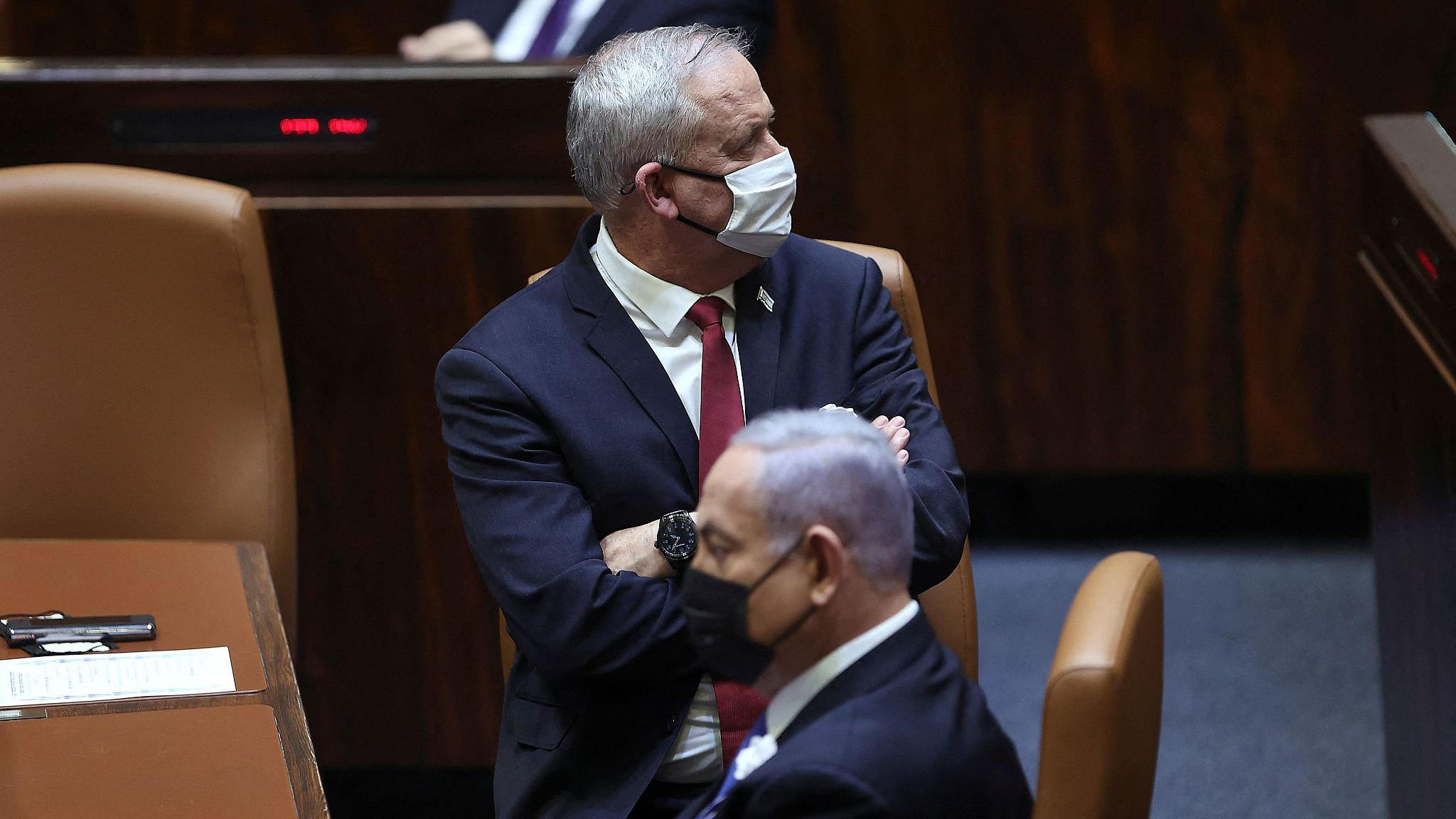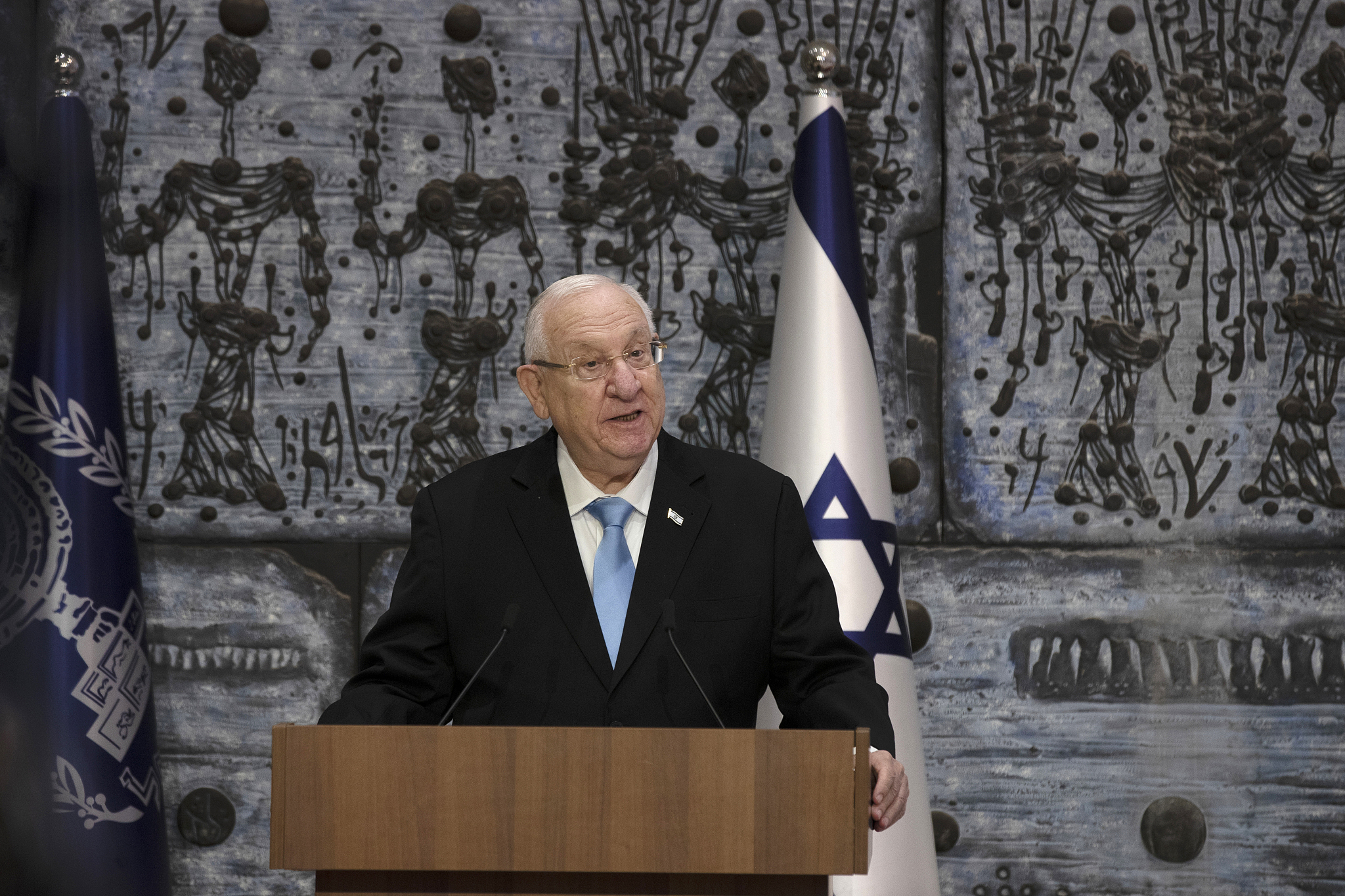
Israeli Prime Minister Benjamin Netanyahu (R) and Defense Minister Benny Gantz attend the swearing-in ceremony of Israel's Knesset (parliament) in Jerusalem, April 6, 2021. /Getty
Israeli Prime Minister Benjamin Netanyahu (R) and Defense Minister Benny Gantz attend the swearing-in ceremony of Israel's Knesset (parliament) in Jerusalem, April 6, 2021. /Getty
Editor's note: Thomas O. Falk is a London-based political analyst and commentator. He holds a Master of Arts in international relations from the University of Birmingham and specializes in U.S. affairs. The article reflects the author's opinions and not necessarily the views of CGTN.
Israel's incumbent Prime Minister Benjamin Netanyahu has been tasked to form a new government after the country voted on March 23. Neither he nor his opponents possess a majority in parliament. The interests are too different, the personal animosities too great, and the next election is hence inevitable.
Last Tuesday, Israeli President Reuven Rivlin announced that he had tasked Prime Minister Benjamin Netanyahu to form a government.
It will not change the political encumbrances in Israel even after the fourth election in only two years.
Neither the conservative-religious bloc around Netanyahu nor the opposition possesses a majority in the Israeli parliament, the Knesset. Thirteen parties passed the electoral threshold of 3.25, which results in a parliament with thirteen different interests.
The fragmented political system is the main reason Israel has not been able to form a stable, lasting government for years.
As a result, neither Netanyahu with his Likud party nor opposition leader Yair Lapid with his Yesh Atid party can form a coherent coalition, a community of interests that could serve the country and the people successfully.
The situation is so dire that Netanyahu is now even inclined to court the conservative United Arab List (Ra'am) to obtain the majority he requires to stay in office.

Israeli President Reuvin Rivlin urged the country to form a government and avoid an unprecedented fifth consecutive round of balloting in Jerusalem, March 31, 2021. /Getty
Israeli President Reuvin Rivlin urged the country to form a government and avoid an unprecedented fifth consecutive round of balloting in Jerusalem, March 31, 2021. /Getty
Ra'am leader Abbas has already stated that he does not seek to "be part of a right or left block." However, the fact that such an absurd constellation between a Netanyahu bloc of ultra-orthodox forces, religious parties, the Zionist party, the far-right and a Ra'am that seeks diametrically opposed policies to Netanyahu has become an option, displays how broken Israel's politics and party landscape have become.
The situation is not different with Yesh Atid, which obtained the second most votes. It strives for an alliance that has only one thing in common: opposition to Netanyahu. However, such an alliance equates to a coalition between the left, conservatives like Gideon Saar and his New Hope party, Arabs and secularists nationalist like Avigdor Lieberman's Yisrael Beiteinu and the far-right such as Yamina. All are united in their antipathy for Netanyahu but are worlds apart ideologically.
On Monday, Yair Lapid offered Naftali Bennett, the leader of Yamina, a coalition with a rotation in the prime minister's office. He was even ready to let Bennett serve first.
However, as Benny Gantz had to realize during the previous government, a rotation of the prime ministership is unlikely to be the ultima ratio. The latter constellation was established after the 2020 election did not provide solid results. The COVID-19 pandemic then forced a coalition between Likud and the center alliance Blue-White of Benny Gantz. After continuous power struggles, it collapsed in December over a budget dispute. Instead of being on his way to Beit Aghion, the prime minister's residence, Gantz now finds himself in political insignificance since his party lost several seats.
But even if a rotation agreement between Bennett and Lapid were conceivable, the odds that either Netanyahu or Lapid can form a bloc that provides a stable government to finally tackle the country's problems – for example, passing a new budget – and serve an entire legislative period, remain slim.
Netanyahu and the corruption allegations against him are only partially to blame. His Likud is the only party that, with election results around 25 percent, even comes close to meeting the demands of a people's party.
Israel's more significant problem is that most parties outside the Likud represent particular interests, not the greater good of the country.
Moreover, several personal animosities exist between the individual party leaders such as Netanyahu and Saar and an underdeveloped willingness to compromise. Even a Netanyahu resignation – which is highly unlikely - would not change much, as the fight for his successorship would be no less fierce than the one against him.
Israel is one of the world's leading technological nations. It vaccinates faster against COVID-19 and last year implemented a new peace order for the region with various Arab nations and Washington.
However, it remains unable to form a stable government. It is apparent where this paralysis will lead: the fifth election in two years.
Unless its leaders can overcome animosities and see the bigger picture, Israel will continue to find itself in a political Groundhog Day.
(If you want to contribute and have specific expertise, please contact us at opinions@cgtn.com.)

